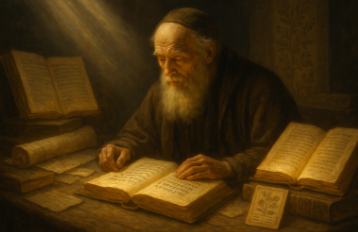Knoch Under Fire
07-10-2025 - Posted by Geert-JanOriginally posted on October 25, 2005 – by Andre Piet
This past week, a frontal attack took place on the forum against the work of Adolph Ernst Knoch (1874–1965). It was claimed that most of what he wrote was nonsense, that he was a major blunderer, that he distorted Scripture, that he was a false teacher, and so on.
Now, on the Goedbericht site I rarely refer to the figure of Knoch, because I deliberately do not want to appeal to human authority. But such explicit slander as that of the past week is difficult to leave unanswered.
The name of Knoch is inseparably linked to the rediscovery of many fundamental truths from the holy Scriptures. A selection:
- God is GOD – that is, the One who “has made everything for its own end.” Even evil. Nothing ever goes wrong with Him;
- There is “one God, the Father,” while the Son of God is “the Image of the invisible God, the Firstborn of every creature”;
- The aions (eons or ages) are world time-periods that have both a beginning and an end (in contrast to the prevailing idea of an “endless eternity”);
- “God is the Saviour of all mankind”;
- “The dead are aware of nothing”;
- A correct arrangement of the New Testament letters based on Galatians 2:7-9;
- etc.
Absolute reverence for what “is written” characterized the sharp-minded Knoch. That is why he was able to discover so unimaginably much in the Scriptures. And that brings me to the final and most important point I wish to highlight in this brief tribute to this ‘giant.’
Early on, Knoch discovered that the greatest progress in scriptural study is made when one starts with the concordance based on the original text. After all, the meaning of a word is determined by the way it is used. Through an index of key words, one can learn the precise meaning of a word.
But because a concordance on the original text often reveals the DIScordance of Bible translations, Knoch became aware of the necessity of developing a translation method based on concordance. The aim: to eliminate human interpretation as much as possible and to confront the Bible reader directly with the facts of the original text.
In this way, Knoch became the pioneer of the concordant translation method and dedicated his entire long life tirelessly to bringing the inspired text as closely as possible to the Bible reader. Rightly so, one of his co-workers said at his funeral in 1965:
“Knoch belonged to a group of people who dedicated their lives to the task of classifying God’s marvelous world of words, just as the great botanist Linnaeus did for the wondrous world of God’s plants.”
Malicious tongues may call Knoch a “major blunderer,” but such accusations say more about the accuser than about Knoch himself. To this day, his immense legacy remains of inestimable value to many who pursue the careful study of the Scriptures.
After the forum turmoil of the past week, it seemed appropriate to let this perspective be heard as well.

 English Blog
English Blog